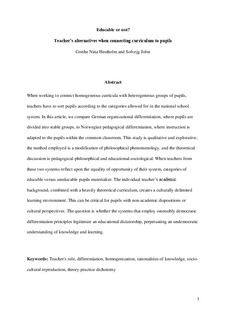Educable or not? Teacher’s alternatives when connecting curriculum to pupils
Journal article, Peer reviewed
Accepted version
Permanent lenke
http://hdl.handle.net/11250/2614278Utgivelsesdato
2019Metadata
Vis full innførselSamlinger
Originalversjon
Hestholm, G. N., & Jobst, S. (2019). Educable or not? Teacher’s alternatives when connecting curriculum to pupils. Journal of Curriculum Studies, 1-16. 10.1080/00220272.2019.1650117Sammendrag
When working to connect homogeneous curricula with heterogeneous groups of pupils, teachers have to sort pupils according to the categories allowed for in the national school system. In this article, we compare German organizational differentiation, where pupils are divided into stable groups, to Norwegian pedagogical differentiation, where instruction is adapted to the pupils within the common classroom. This study is qualitative and explorative; the method employed is a modification of philosophical phenomenology, and the theoretical discussion is pedagogical-philosophical and educational-sociological. When teachers from these two systems reflect upon the equality of opportunity of their system, categories of educable versus uneducable pupils materialize. The individual teacher’s academic background, combined with a heavily theoretical curriculum, creates a culturally delimited learning environment. This can be critical for pupils with non-academic dispositions or cultural perspectives. The question is whether the systems that employ ostensibly democratic differentiation principles legitimize an educational dictatorship, perpetuating an undemocratic understanding of knowledge and learning.
